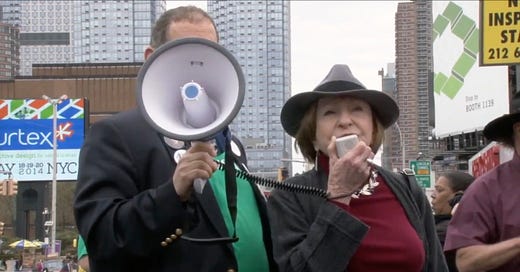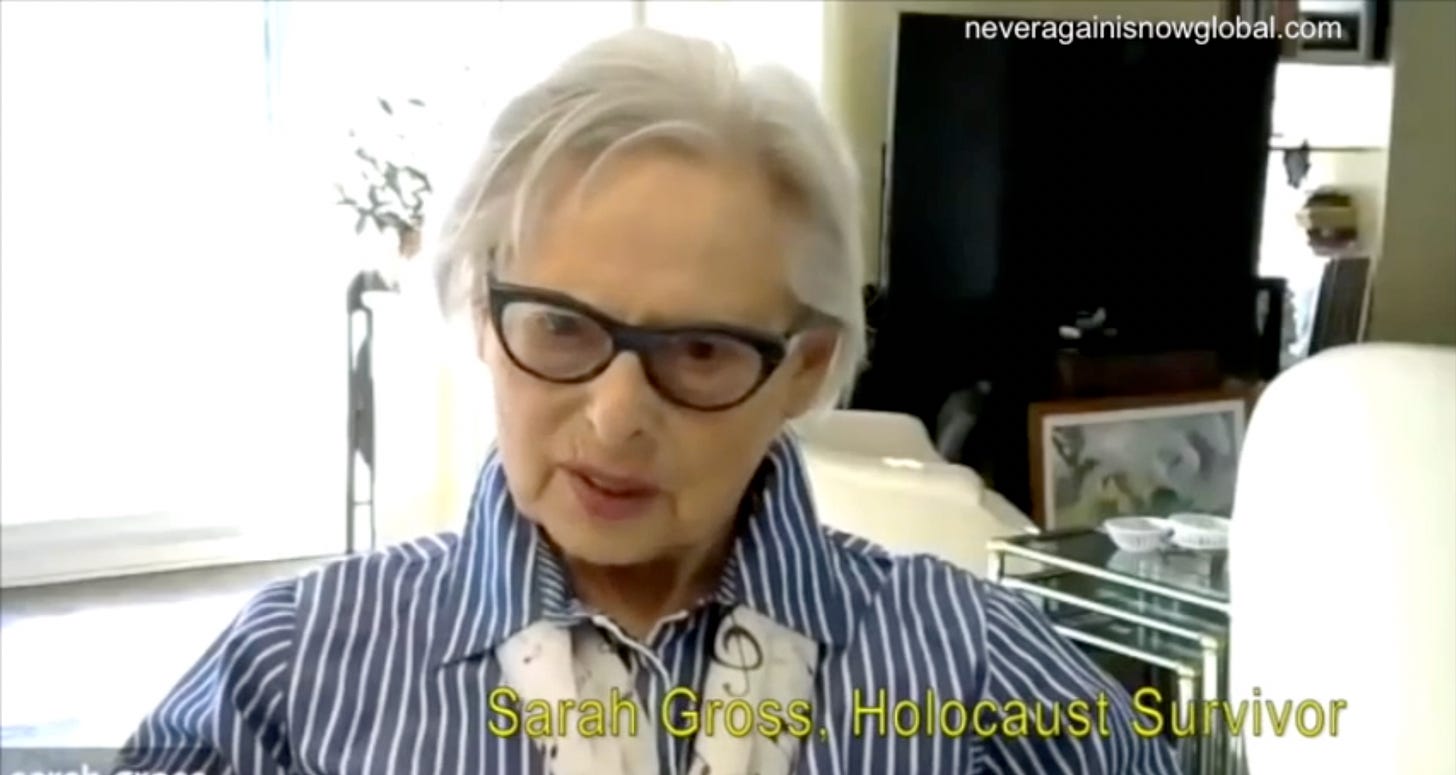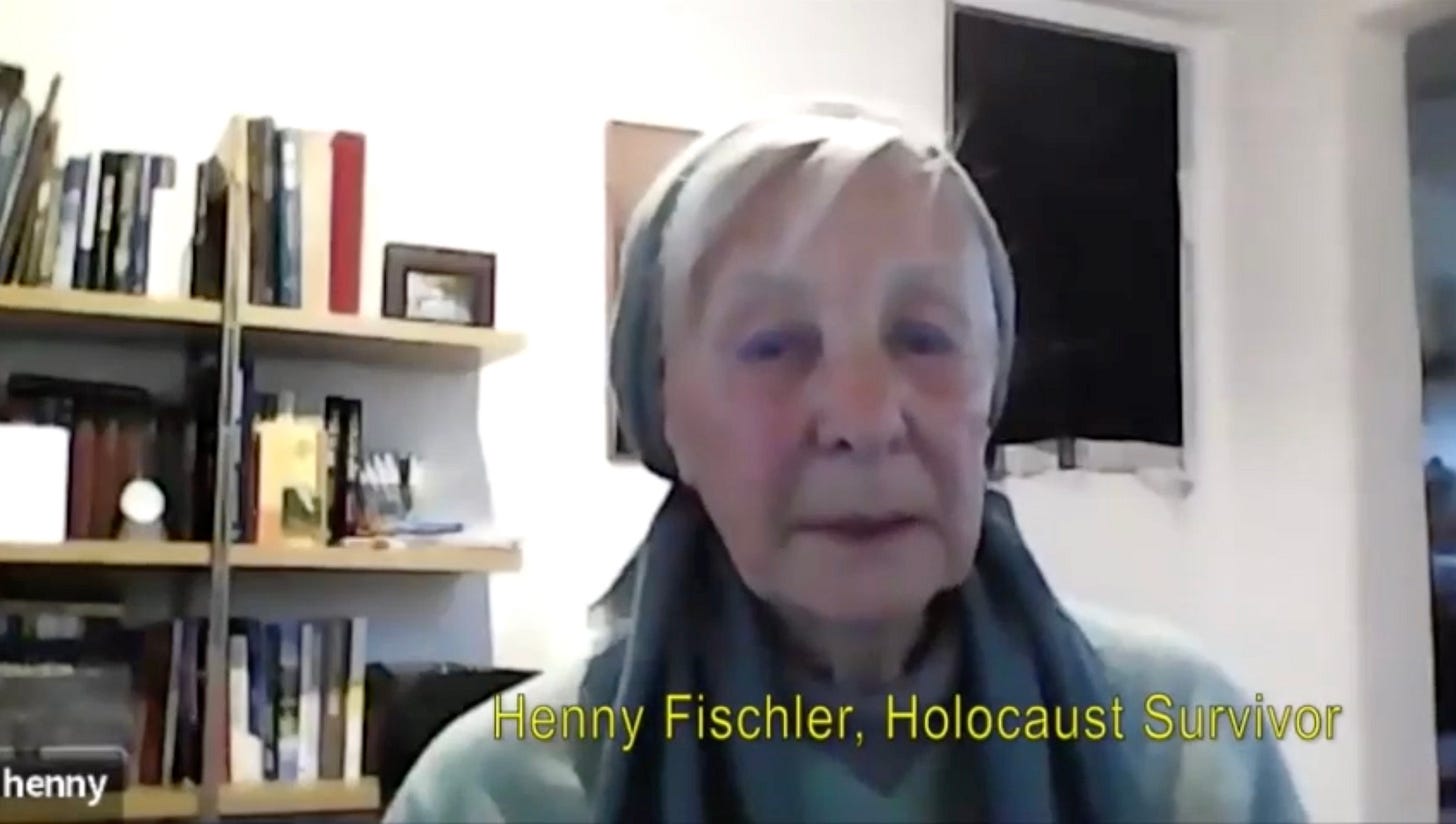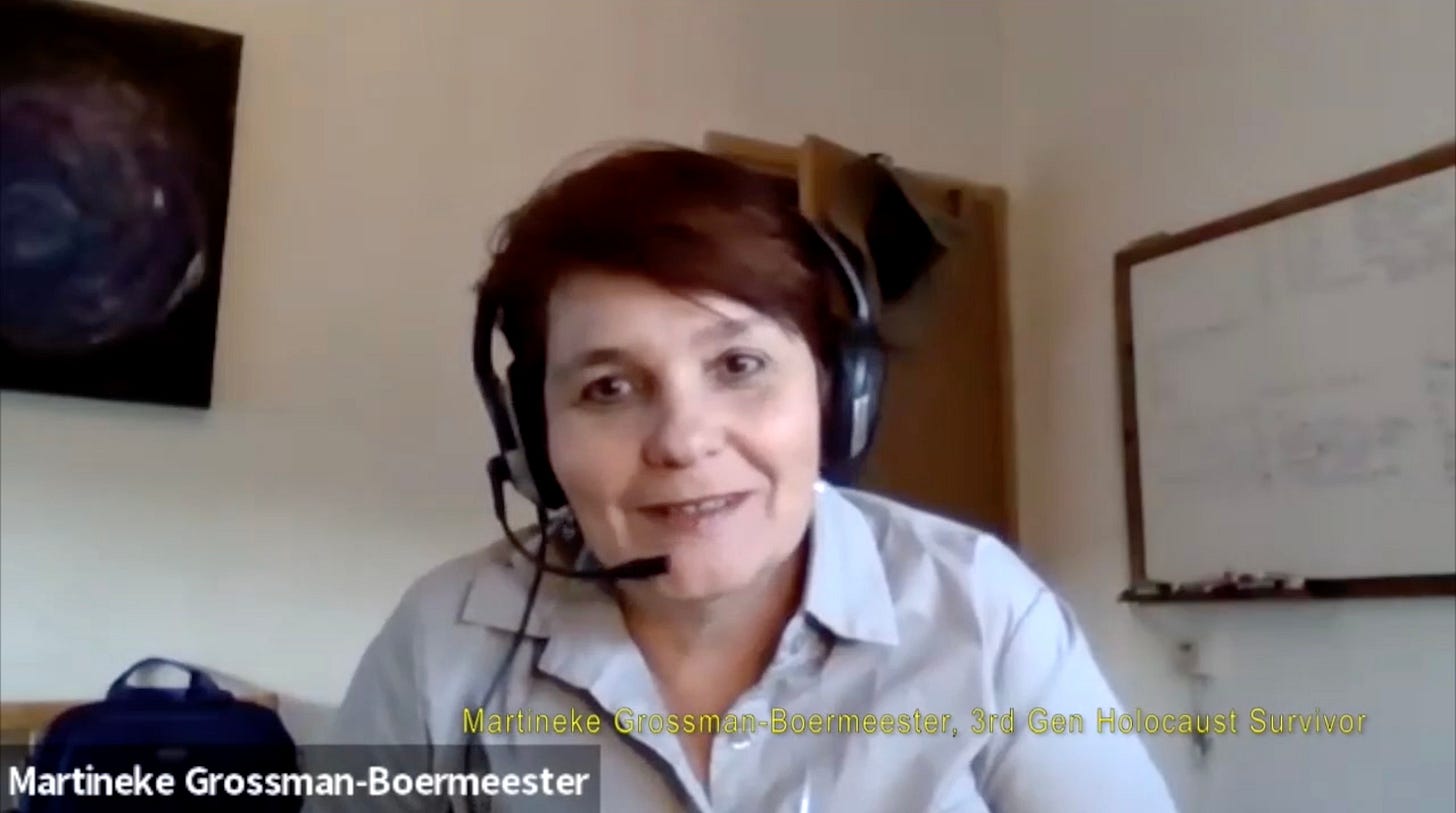»Regular, normal, nice people did the most horrible things«
Never Again Is Now Global: Holocaust Survivors Speak Out on Parallels between the 1930s and the Present
A new documentary, “Never Again Is Now Global” has caused irritation to societies around the world which were about to go back to “business as usual”. That is not possible, according to the documentary by Vera Sharav, president of the “Alliance for Human Research Protection” and director/producer of the five-part-epos which draws explicit parallels between the 1930s, that lead up to the Holocaust, and the present situation with totalitarian Covid-policies. However, whilst some have tried to object to “comparisons which trivialize the Holocaust”, this is not an accusation which can be levelled against Sharav’s work: the octogenarian from New York is herself a Survivor of the Shoa, as are three other contributors to the film which raise their voice in Episode one (“Here We Go Again On Steroids”).
Vera Sharav
My birth name was Vera Roll, and I was born in Romania in April 1937. And in 1941, we were deported, and herded into a concentration camp in Ukraine, where my father died before I was five. (…)
I landed [in New York] in January 8th, 1948. Adjusting to America was harder, much harder. When I looked around, really, New York, it was glamorous and pretty well—people were well off. And I thought, “Where was everybody? Where was everybody?” As life went on, I learned that there are many instances where terrible things, including genocides, happen in one corner of the world, and the rest of the world is totally disinterested.
Sarah Gross
My name is Sarah Gross, and I was born in Budapest in 1932. I really had no problem growing up — it was in the ghetto actually. But I didn’t feel anything different. I had quite a happy childhood. I even studied the piano, and it was [okay], up until the Germans came into the city, which was quite late in the war. But later on, everything changed. (…)
My father was put in a hard labor camp, and my mother was taken to the concentration camp. It’s so difficult, now that it started, this digging into the past. It’s like opening the Pandora’s box. Suddenly things come back to me, and thinking of how it turned out to be, what happened, and the whole process.
When my mother got into the concentration, [she] was taken away from a former superintendent, who spied on her. She told the Nazis, “There is another Jewish lady there in that apartment. Take her away.” That’s how [my mother] got there. (…)
[Today] is a déjà vu. I feel exactly …, I mean, people tell us what to do now. People are telling us how to do, how to go, what shops to close? And because of what? Because of the false whatever-it-is. I don’t believe in the COVID. I don’t believe in COVID-19. I don’t, simply don’t. It’s all manmade. Manmade to make our lives miserable. That’s it.
I can definitely say what I want. So I lose friends? What can I do? This is how you see who your friends are, actually. But unfortunately, I don’t want to die feeling the same way as I did when the Nazis came in!
I have to get a deep breath… How did we reach this point? People need a disaster to wake up? This is one disaster they didn’t learn from history so far? What happened? What happened to people? They don’t learn anymore? They don’t want to know. They just go on, and on, and on. The same thing. And a few of the top can tell us what to do. I mean, it’s more puppets like that—we are pulled from the string, from the top. — [No!] We don’t have to do that anymore. We don’t have to!
Anyways, I’m so upset about this whole situation, really, I am. I see what Israel is doing now. It breaks my heart. It breaks my heart. It’s just terrible how they are there. They’re agreeing, they’re going with the same things, with the booster. Another booster. (…)
It’s just unfathomable, what’s happening to people. What happened to the educated, the scientist, the doctors, and all the other big shots? They all think this way? I doubt.
[This time ] it’s not just the Jews. It’s the whole world. It’s like a Twilight Zone. (…) And then how people don’t see that, and they are blind to all this.
And my close friends, you call them close friends, they go, “Oh yeah, we have to live with it. We have to get used to it.” I said, “No, no, we don’t have to. We don’t have to. You go ahead and do it.” I won’t be among them! Definitely. I don’t want any more jabs, and I am sorry I took the first two because I didn’t want to lose friends. Everybody was running to get the first two. I got them, and I’m now sorry I did. Maybe that’s why I cannot walk. I don’t know. Who knows what goes on. Honestly, I don’t know anymore. I don’t know.
And it was because of the disaster we had in the Holocaust. It all came to that point. We don’t want to do it again. The same miseries and the same telling us what to do.
Henny Fischler
My name is Henny Fischler, and for the moment, I’m living in Israel. I was born in Belgium, in the year 1938. When I was about four years old, the Germans came into Belgium. When my father, my mother, my brother and myself wanted to flee, we were caught at the border to France, by the Germans, and went to Drancy.
When we were in the cell, in this Drancy, I don’t know how, but my mother succeeded to send a little note to my aunt, who was already in France, that we are there. So, my aunt sent the pastor with money, and he bought us, my brother and me, myself from the Germans. My brother was put in an Italian family, and I was put in a cloister. (…) My parents perished in Auschwitz, so I don’t know them. The only picture that I have from there is only what I said, in the cell, in the prison.
As already Sarah Gross, also Henny Fischler is distinctly irritated by the general public’s failure to notice both similarities to the past, as well as inconsistencies in the present official narrative, and calls on people to question:
(…) And not to me. You know what? Don’t listen to me, but ask questions. Ask the doctors, ask the lawyers, ask. I don’t know who, but ask. And get some answers. (…) And when I’m sending them some—from doctors, from lawyers, from Dr. Zelenko, from the—“Don’t send me anything anymore. I don’t want to listen anymore.” What shall I say? I don’t know. I don’t know…
Martineke Grossman-Boermeester
Martineke Grossman-Boermeester is a third-generation Holocaust survivor, who came to Israel from the Netherlands. She explains how she was raised to be critical of authority and do your own research:
Well, my name is Martineke Grossman-Boermeester. I came to Israel from Holland. The father of my father was Jewish during the Holocaust. That meant also his brothers, and his mother. His father wasn’t Jewish, he was Dutch. And during the Holocaust, when it started, my grandfather said that, “It’s none of anybody’s business if we are Jewish or not.”
So when the Nazis in Holland said that Jewish people need to register, he says, “We are not—I’m not going to do it and nobody in the family is going to do it. You’re not going to do it. It’s none of anybody’s business.” And that decision saved their lives (…)
And then they said, “Well, you know what? They think we are Jewish. They cannot do anything according to the law in Holland, but let’s do something else. Let’s behave differently. If they think we’re Jewish, we can help Jewish people, because nobody suspect that we, the Jewish people, that they suspect that are Jewish, that they’re going to help other people, Jewish people to help them.”
So in their own home, and they were living during the whole World War in Amsterdam, like Anne Frank, in a house, on the third floor, and they had another fourth floor that was regular, and there was the Jewish couple living all the time, and they were just fooling the Germans. They were fooling the Nazis.
The brother of my father—of my grandfather, he was in dealing in art, and he was himself a painter, making beautiful paintings, in the United States, and in Europe there are, in churches, and in the Knesset, you have windows that he created. He was very—an artist. So he thought, “If I’m good in that, I can do other things.” So he created all kind of fake identity cards for people, and he helped other Jewish people, and that’s the reason that in Israel, in Yad Vashem, we have a tree on the name of my great-grandfather, and great grandmother, and the brother of my grandfather. And I don’t know, they said they were scared, but making their fear a way of stop to live, or to be who they are, that was not an option. (…) You have to stay true to yourself, and do whatever you think is right, and ask questions. Never just do what people tell you to do.
And I think that helped me a lot in my life and especially what happened today, or the last two years. I asked questions. I went straight to Pfizer. They have a website, and you can see exactly what this vaccine does, and not does. And so, it’s very simple. I just asked questions, and I read, and I got informed, and I said, “Well, it’s not going to happen. I’m not going to do something I don’t want to do.”
And I think that’s what I learned to be free. That this is freedom. The freedom to choose. The freedom to be whoever you want to be. And listen to your instincts and to your intuition and follow your own heart. And it’s exactly what I’m doing and what I’m telling people to do. So that’s what I learned during this time, that in times when things get tough, that yes, my grandfather, he’s a—my whole family, they are a great example, how I want to be.
Henny Fischler points out how the present situation may seem to be different, in so much as no shots seem to be fired. But still, she says, it is a war. A biological war. She urges people to question what they are being told:
It’s happening now all over the world with this COVID. I didn’t take any shots. I’m against it. I’m against the mask. I’m against people who are telling me what to do with my body, because it’s a lie. It’s a big lie. When people are so blind, I can’t stand it. I have to try to convince them to open their eyes, to open their ears, not to go like sheep.
We went like sheep in the Second World War. You didn’t understand anything? You didn’t learn anything from this war? This is a war. This is another war. Okay, it’s a biological war, but it is a war. Don’t do things without questioning. I was so angry that people are so blind and they don’t understand anything and they don’t learn anything.
I want to show the people that we are going again to another situation that is horrible. You are going like sheep again and again and again. What is frightening also, it’s that today we know that the Nazis, they didn’t die. They are still living in between us, even here in Israel.
I don’t know how they did it, but they are here, and I know they are working silently, but they are here, and they are doing so bad things. And that’s what—I don’t know, I don’t know how to fight them. This is in God’s hands. I don’t know how to fight the fight. Only 20% of the Jews came out from Germany. It will the same sort of thing be here, now.
Like Henny Fischler before, Martineke Grossman-Boermeester makes a distinction between being a Nazi and being German, which she learned from her Grandfather. Otherwise decent people are capable of committing bad deeds:
I think when you look back to the Holocaust, I never understood how Germans can become Nazis, and can just do what they tell you to do. But I don’t want to make the whole comparison, because we are not there yet. I mean nobody was sent. I mean, there were people sent in Australia to camps, and they didn’t kill them there yet. That’s true.
But the process that we are going through is part of what they were doing to them, and I see that it’s possible. It’s not so crazy at all. Most people just think, “Well, we need to do what the government says, and they want what is good for us.” And they trust them and they think that’s the way it is.
So when you look back to what happened in Germany, I can understand now that it happened. And that’s even more—it’s so scary that you can understand what happened there, that it happens again. Not totally. Not with all the killings, yet. But it could happen. It’s not so crazy to think that it did happen. It’s terrifying that people do not learn from history, and that they don’t act on their intuition. I mean, that’s crazy. It’s crazy that you do not understand that what’s going on is not good for you. With so many people. (…)
»Suddenly it is: “Okay, we move on to the next thing.”
That’s not the way it should work.
People need to be held accountable for what they did to people.«
— Martineke Grossman-Boermeester
Two years, everybody told us we need to get the vaccine, and everything, and now suddenly one day, there was corona, the next day it was gone. And nobody’s talking about it anymore. And I mean, that’s the way it is in Israel. Suddenly it’s, “Okay, we move on to the next thing.” That’s not the way it should work. People need to be held accountable for what they did to people. This was really terrifying for many people.
It’s also hard to say, “Well, I was really stupid, or I was really wrong, or why didn’t I ask questions?” And it’s very hard to get people to acknowledge that they were wrong. So, it will take time.
But what I also see is: they make us believe that we are responsible for somebody else. I am responsible for the health of somebody else, and I don’t know what he’s doing, what he’s eating, what he’s smoking, where his environment is. I don’t know anything about him. But I’m responsible for him, and he’s responsible for me. Nobody’s really responsible for anything anymore. So, there is no responsibility at all, because I cannot be responsible for somebody else’s health, and he cannot be responsible for me. So in the end, nobody is responsible for anything. We all need to do whatever they say. This is crazy.
There were many people who—also, my grandfather said there were nice people who did really terrible things, that you would never, ever thought that they would listen to the Germans, or to the Nazis. He always told me, “Don’t call them Germans. They were Nazis.” So, he said that really, regular, normal, nice people did the most horrible things, had the most horrible thoughts, and they didn’t know he was Jewish, so they were talking freely to him, and it’s so scary to see that people, regular, normal, nice people, can just go after this kind of behavior, and that they think it’s okay, for the common good. There is no common good.
Please share this post and help us to raise awareness for the urgent need to debate what happened. Like Martineke Grossman-Boermeester said: “Move on to the next thing? That’s not how it should work!” One way to start a debate in your community is to invite neighbors and friends to watch Never Again Is Now Global.








